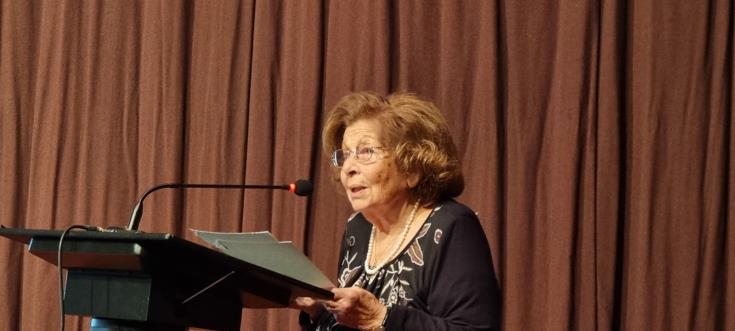Maroula Theodosiadou's book "Journey to the Land of Dwarfs during the Quarantine Era" was presented, which is a pandemic chronicle for all ages. In the context of the presentation, students of Koupateio Elementary School of Paphos and Elementary School of Aradippou painted about the era of quarantine and covid- 19. Drawing inspiration from the book of the author Maroula Theodosiadou donated them, the students of the two schools created and externalized their feelings about the pandemic, which shocked humanity. All the students' works were exhibited during the presentation.
The author in her book, through Frida Harantina, a fictional person, guides the readers on a mental journey due to the coronavirus in the land of the Dwarves. She knows the natural beauties of her place and the people with the small stature and the big heart. Together they faced the many problems created by the imposition of quarantine.
The presentation started with a musical introduction by Marilia Charalambidi and Efthyvoulos Theocharous.
In his position, the President of the Cyprus Pediatric Society Dr., Michalis Anastasiadis on "The pandemic through the eyes of doctors" initially said that when invited to participate in the presentation of Maroula Theodosiadou's book a shiver of emotion and a deep sense of honor and responsibility passed him . Emotion for participating in an event dedicated to an admirable woman and an authentic spiritual man, an honor for the recognition of the contribution of the professional sector he represents but also for his own, albeit small, contribution to the common struggle against the pandemic, responsibility for message that he will attempt, as he said to send as a continuation of the deafening cry of awakening and awareness that Mrs. Maroula gave us with her imaginative timeline.
Dr. Anastasiadis stated that the author's chronicle, despite the fact that it was written a year ago, within the quarantine restrictions, in the aftermath of the unexpected and universal change of our daily life and before vaccines, new drugs, new knowledge enter our lives is still relevant and largely prophetic. As the consequences of the quarantine he so vividly describes exist, they still exist and still affect us, he added. The big problem, unfortunately, was not the necessary restriction and its effects on our mental, social, economic and professional situation and activity. It is the pandemic itself, he stressed, that is still among us, the generative cause of all these effects and seeks what the author herself mentions on the back cover.
This disease, no matter how scientifically predicted by some, found us, he admitted, unprepared. Like a sudden war that requires immediate mobilization but also sows panic, uncertainty, confusion. He demanded, he continued, "acquisition of knowledge in a short period of time, adaptation to the new daily routine of exercising our function, priorities in the treatment of our patients, unprecedented protection measures, anxiety for the fastest and best possible treatment of our ever-increasing needs in our hospitals" .
The constant preoccupation with a particular disease and its consequences created from the beginning added to us, the feeling of fear… lest any other serious health problem we may have to deal with in our patients escape our attention. "As the need for telephone counseling increased and therefore the effort to remotely determine the seriousness of any problem our patient described to us, so did our own anxiety and insecurity," he said. He also pointed out that in the course of the pandemic they were confronted with an unexpected enemy. That of misinformation, the spread of false news and the questioning of our scientific position. And when one considers how easily and quickly technology enables some to take advantage of it, it was a parallel pandemic, with an even more difficult way of dealing with it, he said.
Dr. Anastasiadis said that the numbers, however, are relentless. None of the diseases we have learned or experienced in our career so far, he said, has managed to infect so many people in such a short time. He added that unfortunately they have not yet managed to tell us that we have defeated the crown, however the only thing that can be promised as doctors, nurses and health professionals who have a duty to be on the front line of this battle, will not bend.
If, he said, "we have disappointed you with some of our behaviors, do not judge us harshly. It was also an unprecedented experience for us, with questions, anxiety, disappointments. "But we will continue to work, with zeal and self-denial, until the day when we will no longer feel like dwarfs, when we can all look to the future together with optimism, with dreams and expectations, free from fear and insecurity," he concluded.
Moreover, in the presentation of the author's book, Chrysothemis Hatzipanagi, Philologist, author and literary critic, stated, among other things, that the apparent goal of the teacher-writer, who left an indelible mark on the events of primary and especially primary education. is the pedagogy of the pandemic crisis in the context of an out-of-school fruitful dialogue and why not, as it is unreservedly and practically recommended, an in-school learning conversation with our young shoots, as evidenced by the present visual, linguistic and other ingenious activities of its students. our primary schools. It is thus established that, as he said, in addition to textbooks, good literary books can stimulate children's interest as attractive interactive triggers, so that through multiple ways of expression they externalize the skills and give exemplary self-efficacy to the emotional world of children. their knowledge.
This was followed by the presentation of excerpts from the book by the children of Aradippou A 'Primary School and a rebuttal by the author.
Greetings were also addressed by Prof. Konstantinos N. Fellas, Senior Vice Rector of the University of Nicosia and Stratis Mattheou, Secretary General of PASYDY.
(KYPE / KP / GBA)
